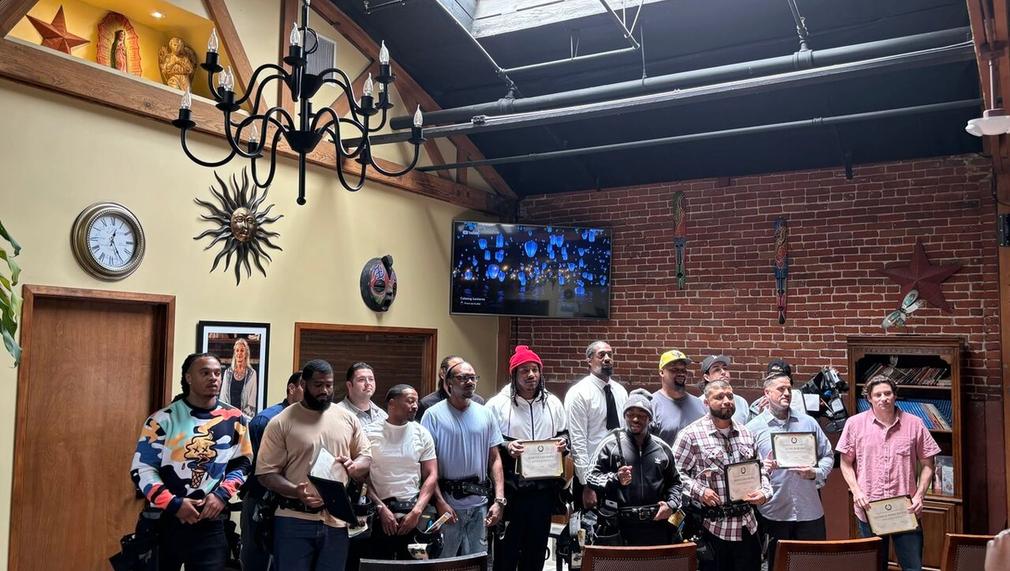AmityWorks Employment Services
For individuals with a history of homelessness and/or incarceration, reentering the workforce is a challenge due to lack of opportunity, time away from the labor market, and having a criminal record. To address this, Amity launched AmityWorks employment services to engage low-income LA County residents (adults age 18+) in vocational training leading to employment. Amity is a potential employer for trainees and intentionally recruits from the pool of training graduates.

What is the primary issue area that your application will impact?
Income inequality
In what stage of innovation is this project, program, or initiative?
Expand existing project, program, or initiative (expanding and continuing ongoing, successful work)
What is your understanding of the issue that you are seeking to address?
In Los Angeles County, 64% of unsheltered homeless adults in the Continuum of Care have a history of involvement with the criminal justice system (Homelessness Policy Research Institute, USC Sol Price Center for Social Innovation, “Homelessness and the Criminal Justice System”, 2020). For individuals with a history of incarceration and/or homelessness, reentering the workforce is a challenge due to lack of opportunity, time away from the labor market, and having a criminal record. This directly impacts the ability to earn income and secure housing. To address this, Amity launched AmityWorks employment services to engage low-income LA County residents (adults age 18+) in vocational training leading to high quality employment. Amity is a potential employer for trainees and intentionally recruits from the pool of training graduates. This program promotes economic self-sufficiency, while addressing homelessness.
Describe the project, program, or initiative this grant will support to address the issue.
AmityWorks will serve low-income individuals with lived experience with homelessness and/or the justice system. Amity recruits trainees from Amity’s residential campuses and re-entry programs. Case managers use a trauma-informed approach to assess needs, develop a training plan, reduce barriers to employment, assist with job placement, and provide supportive services such as transportation assistance, obtaining identification, and work-related supplies. Amity coordinates with partners for training and job placement, such as East LA College, National Apartment Association, CBOs, and others. Amity offers multiple training pathways: 1) Substance Abuse Counselors – Trainees earn a Certificate of Achievement as an Addiction Counselor. This pathway serves individuals with lived experience in the justice system. 2) Facility Maintenance Technicians – Trainees earn a Certificate for Apartment Maintenance Technicians. This pathway serves individuals with lived experience in the justice system. 3) Homeless Services Providers (Careers for a Cause) – Trainees earn a Certificate of Completion in Mental Health First Aid and HMIS (Homeless Management Information Systems). Training includes paid training/internships and serves individuals with lived experience with homelessness and/or the justice system. 4) Individualized Pathways – Trainees gain skills and and prepare for employment in other sectors such as logistics/warehouse technicians and other pathways.
Describe how Los Angeles County will be different if your work is successful.
Amity will provide employment services to 50 low-income job seekers. Anticipated outcomes over 1 year are: 50 individuals served; credential/certificate attainment 64%; employment placement rate 64%. 100 family members will be indirectly impacted by the increased income.
Employment services will increase economic self-sufficiency for some of LA County's most marginalized individuals: those with a history of homelessness and/or incarceration. A growing body of evidence suggests wages and job quality are important determinants of recidivism among former prisoners (Schnepel, K. (2017) Do post-prison job opportunities reduce recidivism? IZA World of Labor (2017): 399 doi:10.15185/izawol.399). With increased skills, earning power, and income, Amity's job seekers will be better positioned to secure stable housing, while also reducing the likelihood of returning to incarceration. Amity's model can be replicated countywide for meaningful impact on the homelessness crisis.
What evidence do you have that this project, program, or initiative is or will be successful, and how will you define and measure success?
Amity began providing employment services over the past 2-3 years, and continues to learn from peer organizations and best practices in the field. With the proposed LA2050 grant, Amity proposes to provide 50 job seekers with employment services for high quality jobs. Anticipated outcomes over 1 year include: enrollment of 50 individuals; credential/certificate attainment 64%; employment placement rate 64%. Amity recently launched a Community Indicators Performance initiative, which will boost the organization's capacity to measure impact. In a recent success story, a 37-year-old Black woman was released from prison and participated in employment services with Amity. After overcoming barriers to employment and completing a 2-week unpaid training course, she was hired as a Bus Operator earning $24/hour full-time at Los Angeles County Metropolitan Transit Authority. As a supportive service, Amity purchased work uniforms for her - an essential step toward economic opportunity.
Approximately how many people will be impacted by this project, program, or initiative?
Direct Impact: 50.0
Indirect Impact: 100.0